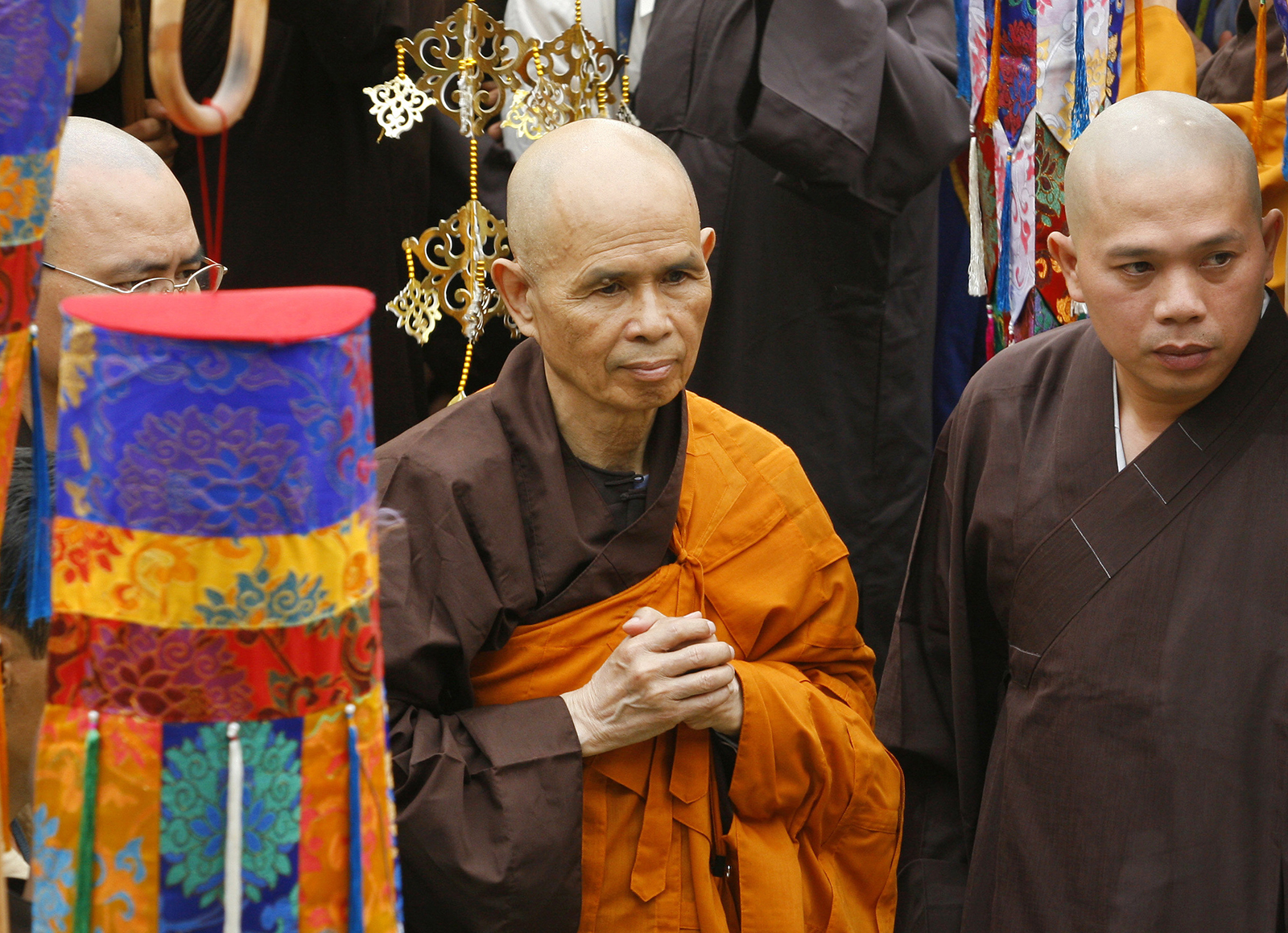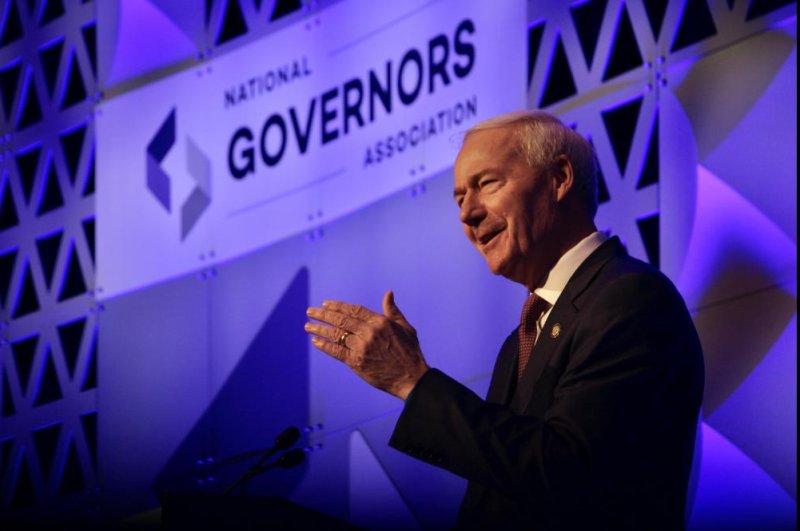How Thích Nhất Hạnh changed the world beyond Buddhism
The determination that fueled his peace efforts may not square with the soft-spoken teacher many knew.

(RNS) — A man once asked a Masai elder, “What makes a good morani?”— a good warrior.
The elder answered, “When the moment calls for fierceness, a good morani is very ferocious. And when the moment calls for kindness, a good morani is utterly tender.” But what makes a great warrior, the elder added, “is knowing which moment is which.”
The Vietnamese Zen Buddhist teacher Thích Nhất Hạnh, who passed away Jan. 21 at 95, may be the personification of this fierce and tender warrior. Over his long life he devoted himself to promoting peace, mindfulness and “Engaged Buddhism,” a term Nhất Hạnh coined to stress the importance of applying Buddhist principles of non-violence and compassion to social, political and environmental action.
The man whom students affectionately called Thay — teacher in Vietnamese — was a greatly beloved and accessible master whose popularity and influence in the Buddhist world is only rivaled by that of His Holiness, the Dalai Lama. Millions of seekers who might not have otherwise engaged with Buddhism have come to his teachings to learn how to apply mindfulness to daily life. As a result, Nhất Hạnh is popularly known as “the father of mindfulness.”
RELATED: Thích Nhất Hạnh, Zen master who preached compassion and nonviolence, dies
Born in 1926 in central Vietnam, Nhất Hạnh, whose given name was Nguyen Xuan Bao, became a novice monk at the age of 16 and later studied science at Saigon University before becoming fully ordained at Tu Hieu Temple in 1949. When the war arrived in Vietnam a few years later, Nhất Hạnh became actively involved in its opposition. On a trip to North America, he met with U.S. Secretary of Defense Robert S. McNamara and asked him to stop bombing Vietnam, later outlining a five-point peace proposal.
The quiet fierceness and determination that fueled his peace efforts in Vietnam and, later, his steadfastness in the face of the Communist government’s persecution of Buddhist sects, may not square with the soft-spoken teacher his followers know today, whose mindfulness practices seem to encapsulate the gentleness that characterized him.
But from the late 1960s, Nhất Hạnh organized to fight the worst effects of the war and the regime that came to power in its wake. He founded the School of Youth for Social Service, a grassroots relief agency of 10,000 volunteers that introduced schooling, health care and basic infrastructure to villages all over Vietnam. And he established the Order of Interbeing, an international community of laypeople and monastics dedicated, as their website says, “to the continuous practice of mindfulness, ethical behavior, and compassionate action in society.”

FILE – In this March 16, 2007 file photo, Vietnamese monk Thích Nhất Hạnh, center, arrives for a Great Chanting Ceremony at Vinh Nghiem Pagoda in Ho Chi Minh City, southern Vietnam. (AP Photo)
Banned from returning to Vietnam after an American and European teaching tour, Nhất Hạnh settled in France, where he eventually founded Plum Village, a Zen community that hosts over 200 monastics, as well as 8,000 visitors a year.
In addition, Nhất Hạnh also leaves behind nine monasteries and dozens of practice centers around the world, not to mention more than the 100 books he has written.
But his legacy cannot be quantified — or easily overstated. Insisting that for Buddhism to be relevant, it had to be engaged in tandem with the issues of its day, Nhất Hạnh met with fellow peace activists Thomas Merton and the Rev. Martin Luther King Jr. among others. Nhất Hạnh urged King to publicly oppose the Vietnam War — which King did for the first time in a famous speech given at Riverside Church in New York. King later nominated Nhất Hạnh for the Nobel Peace Prize, but the prize was withheld because King broke the rules by making his nomination public.
Nhất Hạnh’s influence extended far beyond his high-profile connections, however. It grew out of his deep embodiment of the peace he consistently taught, and anyone fortunate enough to be in the great teacher’s presence felt without a doubt the truth that governed his life: He lived exactly as he preached.
In a conversation with Oprah Winfrey, Nhất Hạnh said that when he was 7 years old, he saw a picture of a peaceful, smiling Buddha in a magazine. “I was impressed,” he said. “People around me were not like that, so I had the desire to be someone like him.” And for the next 88 years, that’s exactly who he was.
Nhất Hạnh taught us Westerners how to walk mindfully, simply for the sake of walking and without a goal in sight. He modeled eating with complete attention, seeing even a tiny raisin as “an ambassador of the cosmos.” He showed us it’s possible to dwell unhurried in each moment and to work with our impatience, our restlessness, our incessant dissatisfaction. He even taught us how to love.
The best thing we have to offer someone we love, Nhất Hạnh said, is our presence. His mantra, “Darling, I am here for you,” was meant to galvanize the quality of attention needed to show someone we care. It’s a deceptively simple teaching with the power to transform our relationships, if only we are courageous enough to take it up.
But if he was an unparalleled popularizer of mindfulness, Nhất Hạnh’s message challenges today’s trendy understanding of it as a technique to de-stress ourselves as we dash through our hectic lives. As Nhất Hạnh taught it, mindfulness is a means to put an end to our own and others’ suffering. It is integrally tied to compassion, to happiness and to peace.
RELATED: Thich Nhat Hanh, who worked for decades to teach mindfulness, approached death in that same spirit
“To be is to inter-be,” he said: We cannot help but affect one another with every one of our actions, every one of our words, and even every one of our thoughts. That’s why, more than any other teacher of his time, Nhất Hạnh understood that the only way to freedom is to live it with every step.
If the Buddha taught that liberation is possible, Nhất Hạnh, with his fierce tenderness and his unrelenting dedication to the practice of mindfulness, peace and compassion in every single moment, showed us how.
(Vanessa Zuisei Goddard is a writer, editor, and lay Zen teacher based in Playa del Carmen, Mexico. She is the author of “Still Running: The Art of Meditation in Motion.” The views expressed in this commentary do not reflect those of Religion News Service.)











:quality(70)/cloudfront-eu-central-1.images.arcpublishing.com/thenational/QMQUBKEWFEGL6H7TDL5JQTJJSA.jpg)

